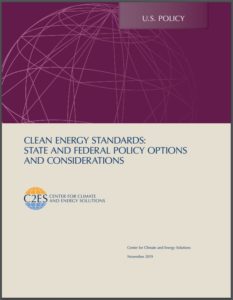Full Title: Clean Energy Standards: State and Federal Policy Options and Considerations
Author(s): Center for Climate and Energy Solutions
Publisher(s): Center for Climate and Energy Solutions
Publication Date: November 20, 2019
Full Text: Download Resource
Description (excerpt):
While market dynamics and current state and federal policies have led to recent growth in clean energy generation—such as the growth in renewable generation driven in part by state renewable electricity portfolio standards and federal tax incentives—projections for the power sector indicate that, absent significant new policies to promote clean generation, the pace of transition to cleaner power generation, needed to meet our climate change challenge, will be insufficient.
Given the imperative of transitioning to cleaner electricity, policymakers have redoubled their attention to a number of significant, climate-focused proposals, including the idea of a clean energy standard (CES) that prioritizes performance and outcome rather than particular technologies. A CES is a type of electricity portfolio standard that sets aggregate targets for the amount of clean electricity that electric utilities (and other retail providers) are required to sell. Program flexibility is provided by: (1) defining clean electricity more broadly than just renewables, and (2) allowing market-based credit trading to facilitate lower-cost compliance. As a concept, a CES builds on the successful experience of the majority of states that have implemented renewable and alternative energy portfolio standards and draws on a history of federal policy deliberation regarding national electricity portfolio standards.
This report explains how a CES works, describes the benefits that a CES can deliver, and explores federal and subnational options for CES policies. In addition, it examines some nuances of CES policy design, how a CES might integrate into economywide market-based solutions, and the implications of different design choices. This discussion can assist state and federal policymakers, utility regulators, and other stakeholders in deciding whether a CES is an appealing policy option.
